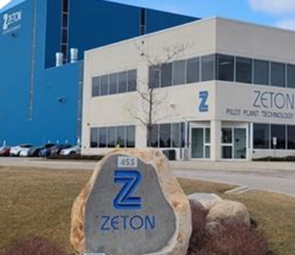Green news: Aduro engages Zeton to build HCT recycling plant; Milliken invests in Tidal Vision to advance chitosan as biomaterial

Canadian recycler Aduro Clean Technologies Inc says it has appointed construction firm Zeton Inc to build a pilot plant for its proprietary Hydrochemolytic technology (HCT) for converting waste into resources. The 10 kg/hour HCT pilot plant will be located at the company’s facility in London, Ontario, and marks the next phase in Aduro’s strategic plan to scale its HCT technology toward full commercialisation.
A key objective for 2024 has been the completion of the pilot plant design, which remains on schedule. Fabrication, delivery, installation, and commissioning are targeted for Q3 2025. Concurrently, site preparation, staff training, and materials sourcing are progressing to ensure alignment with the project timeline.
This pilot plant will build upon the company’s years of extensive research aimed at optimising the requirements for HCT at a commercial scale. Designed with modularity and scalability at its core, the HCT plant will enable Aduro to define optimal configurations of its unique reactor system to process each of the many local variations in the wide range of feedstocks that are suitable for the process, making it highly suited to project-specific needs across diverse customer applications.
It adds that this flexibility is especially valuable to Aduro’s current and prospective collaborators, who are exploring the use of advanced chemical recycling across a wide range of plastic waste feedstocks, each with unique characteristics and requirements.
“Our engagement with Zeton adds significant engineering capabilities. We are excited and feel that we are in a strong position to accomplish our goals working with such an experienced global leader,” said Ofer Vicus, CEO of Aduro. “Our HCT pilot plant will serve as a key platform for validating HCT’s performance in real-world conditions, bringing us closer to the design and construction of a commercial demonstration plant,” continued Vicus.

In other news, materials firm Milliken & Company has announced an investment and partnership with Tidal Vision, a biomolecular technologies company unlocking chitosan, which is derived from crustacean-waste shells, to develop scalable solutions for industries. It adds that this strategic partnership will accelerate the introduction of biodegradable chemistries across the markets that Milliken serves and is the latest in a series of investments made as part of Milliken's ventures programme.
Tidal’s chitosan-based technologies provide high-performance solutions throughout the water treatment, agriculture, and material science industries. Chitosan that is derived from chitin, is the second most abundant biopolymer after cellulose. It is known as a versatile polymer for many applications due to its properties such as biodegradability, non-toxicity, antibacterial effects, and hydrophilicity.
Milliken's investment will increase the availability of responsibly sourced materials with biodegradable properties in multiple applications. This is made possible by Tidal Vision's proprietary technologies that transform chitosan, a biodegradable compound, into high-performance chemistries.
"We recognise the growing demand for responsible solutions that meet the highest standards of performance — and creating a path to offering biodegradable technologies represents an important step in that direction," said Cindy Boiter, EVP and President of Milliken's Chemical Business. "Our partnership with Tidal Vision is a natural fit, as their innovative approach to sustainable materials aligns with our commitments to collaboration, innovation, and sustainability."
Headquartered in Bellingham, Washington, with more than 200 employees and facilities in five states, Tidal Vision leverages advanced manufacturing technologies and partners with industry leaders like Milliken to offer new and powerful chemistries at scale. Tidal Vision is built on the belief that chitosan solutions have the unique potential to help humanity on an industrial scale, it adds.
(PRA)SUBSCRIBE to Get the Latest Updates from PRA Click Here»








